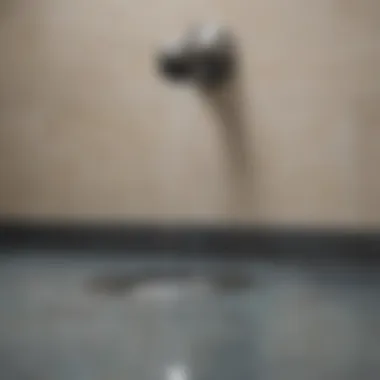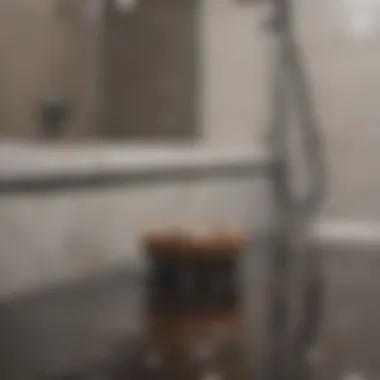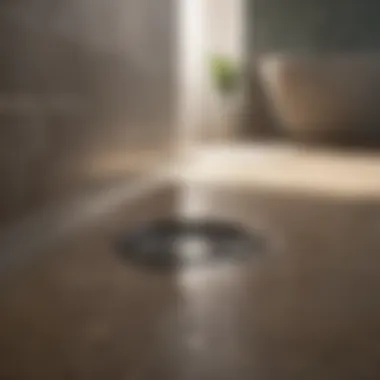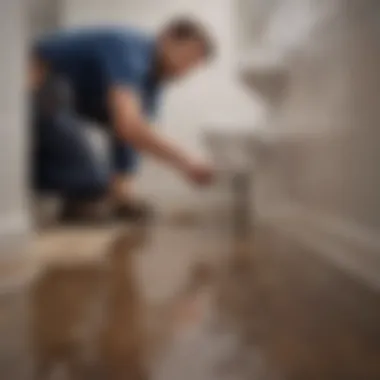Troubleshooting a Stubbornly Clogged Shower Drain: A Comprehensive Guide for Homeowners


When facing the frustrating issue of a clogged shower drain, it's essential to tackle it promptly and efficiently. This guide aims to equip homeowners with a comprehensive understanding of the causes behind stubborn clogs and provides detailed solutions to restore proper drainage in your shower.
Causes of Shower Drain Clogs
Shower drain clogs can be attributed to various factors, such as hair buildup, soap scum accumulation, and even mineral deposits. These elements can gradually obstruct the flow of water, leading to slow drainage or a complete blockage. Understanding the root cause of the clog is paramount in effectively addressing the issue.
Hair Buildup
One of the primary culprits behind shower drain clogs is hair accumulation. As you shampoo and condition your hair in the shower, loose strands often get washed down the drain, where they can cluster and form blockages over time. Regularly clearing out hair from the drain can help prevent clogs from worsening.
Soap Scum
Soap residue can combine with minerals in the water to create a stubborn buildup known as soap scum. This sticky mixture adheres to the walls of the drain pipe, constricting the passage for water to flow through. Removing soap scum requires particular attention to ensure thorough cleaning.
Mineral Deposits
In areas with hard water, mineral deposits like calcium and magnesium can accumulate in the drain, contributing to clogs. These deposits solidify over time, reducing the diameter of the pipe and hindering water flow. Addressing mineral buildup involves utilizing effective descaling methods.
Solutions for Unclogging the Drain
Once you've identified the cause of the clog, it's time to explore solutions to restore proper drainage in your shower. From DIY methods to professional interventions, there are various approaches to consider based on the severity of the clog.
DIY Drain Cleaning
For minor clogs, DIY solutions like using a combination of baking soda and vinegar or employing a drain snake can effectively dislodge debris and improve water flow. These methods are cost-effective and accessible for most homeowners seeking to unclog their shower drain.
Chemical Drain Cleaners
In cases of persistent clogs, chemical drain cleaners can be a more potent solution. These products contain strong chemicals that break down clogs, allowing water to pass through more easily. However, caution must be exercised when using these cleaners, as they can be corrosive to pipes.
Professional Plumbing Services
If DIY attempts prove ineffective or the clog is particularly severe, seeking assistance from professional plumbers may be necessary. Experienced plumbers have the expertise and tools required to assess and resolve complex clogging issues, ensuring long-term solutions for optimal drain performance.
Importance of Regular Maintenance


To prevent future clogs and maintain a smoothly functioning shower drain, implementing regular maintenance practices is crucial. Simple habits like installing drain covers to catch hair and periodically flushing the drain with hot water can help minimize the risk of recurring clogs. By incorporating preventive measures into your routine, you can prolong the life of your shower drain and enhance its efficiency.
Conclusion
Introduction
Understanding the Frustration
The annoyance of a clogged shower drain
A clogged shower drain is more than just an inconvenience; it can lead to water pooling and slow drainage, causing disruptions in daily life. The accumulation of hair, soap scum, and mineral deposits contributes to this annoyance. Addressing this issue promptly is crucial to prevent further complications and maintain a functional bathroom. The unique challenge of a clogged shower drain lies in its ability to impede the flow of water effectively, degrading the overall shower experience.
Impact on daily routine
The impact of a clogged shower drain goes beyond mere annoyance, affecting the efficiency of daily routines. From prolonged showers due to slow drainage to dealing with standing water, the consequences are evident. This disruption can lead to time wastage and increased stress levels. Understanding how a clogged shower drain impacts the daily routine is essential in highlighting the urgency of resolving this issue promptly to restore normalcy and convenience.
Signs of a Clogged Shower Drain
Water pooling in the shower
Water pooling in the shower is a clear indication of a clogged drain, caused by blockages hindering proper water flow. This not only creates unsightly puddles but also poses slippery hazards. Addressing water pooling promptly is crucial to prevent potential accidents and maintain a safe shower environment. The unique characteristic of water pooling serves as a visual cue for identifying shower drainage issues, prompting timely intervention.
Slow drainage
Slow drainage in the shower can be frustrating, lengthening shower times and reducing water efficiency. It is often caused by the buildup of debris within the drain, impeding the smooth flow of water. Recognizing the signs of slow drainage, such as water taking longer to recede, is essential for initiating corrective measures promptly. The unique feature of slow drainage is its gradual onset, progressively worsening over time until addressed effectively.
Unpleasant odors
Unpleasant odors emanating from a clogged shower drain are not only a nuisance but also a sign of bacterial growth within the drain. These odors can spread to other areas of the bathroom, creating an unwelcoming environment. Addressing the root causes of these odors is vital to ensure a fresh and hygienic shower space. The distinctive feature of unpleasant odors serves as an olfactory alert, signaling the presence of underlying drainage issues that require immediate attention.
Causes of a Clogged Shower Drain
When it comes to the vexing issue of a clogged shower drain, understanding the root causes is paramount in effectively addressing the problem. The accumulation of debris such as hair, soap scum, and mineral deposits often leads to blockages in the drain, hampering water flow and causing inconvenience to homeowners. By delving into the causes of a clogged shower drain, we shed light on the underlying factors contributing to this common household issue, empowering individuals to take proactive measures in maintaining a smoothly functioning drainage system.
Hair Build-Up
Impact of hair accumulation


Hair accumulation stands out as a primary culprit in shower drain clogs, with strands of hair easily forming clumps that obstruct the flow of water. This accumulation not only slows down drainage but also traps other debris, exacerbating the blockage. The resilience of hair against disintegration in water makes it a persistent nuisance, requiring preventive action to mitigate its detrimental effects on shower drain performance. Understanding the impact of hair accumulation is crucial in devising effective strategies to prevent and address clogs effectively.
Prevention methods
To combat the troublesome consequences of hair build-up, adopting preventive measures is key. Installing drain guards or strainers can intercept loose hair before it infiltrates the drain, reducing the likelihood of clogs. Regular removal of trapped hair from these devices, coupled with periodic cleaning of the drain, can significantly minimize the risk of blockages. Additionally, incorporating hair-catching technology in drainage systems can offer a long-term solution to the recurring issue of hair accumulation, promoting unhindered water flow and optimal drain functionality.
Soap Scum
Formation of soap scum
The formation of soap scum occurs when the fatty components of soap react with minerals in hard water, creating a sticky residue that adheres to surfaces. Over time, this residue accumulates in the shower drain, constricting the passage of water and contributing to clogs. Understanding the genesis of soap scum is essential in implementing effective cleaning strategies to prevent its build-up and maintain optimal drainage conditions.
Cleaning techniques
Combatting soap scum requires targeted cleaning techniques to dissolve and dislodge the stubborn residue. Utilizing acidic solutions like vinegar or specialized cleaners can effectively break down soap scum, restoring the unobstructed flow of water in the drain. Mechanical methods such as scrubbing with a brush or sponge can further aid in dislodging hardened soap scum, promoting cleanliness and minimizing the risk of drain blockages.
Mineral Deposits
Effects of mineral build-up
Mineral deposits, stemming from the precipitation of minerals in hard water, pose a significant challenge to shower drain functionality. The accumulation of minerals like calcium and magnesium can form stubborn deposits that restrict water flow, resulting in sluggish drainage and potential clogs. Understanding the effects of mineral build-up is crucial in preemptively addressing this issue and preserving the efficiency of the drainage system.
Removing mineral deposits
Effective removal of mineral deposits is essential in restoring optimal water flow in the shower drain. Utilizing descaling agents or homemade solutions like vinegar can dissolve mineral build-up, facilitating the clearance of obstructions in the drain. Mechanical methods such as snaking the drain or utilizing a plumber's auger can further aid in dislodging calcified deposits, ensuring a smooth and unobstructed drainage system for enhanced shower performance.
DIY Solutions for Unclogging a Shower Drain
Dealing with a clogged shower drain can be quite frustrating and disruptive to your daily routine. In this section, we will explore the significance of DIY solutions for unclogging a shower drain within the context of this article. DIY solutions offer homeowners a cost-effective and immediate way to address clogged drains without the need for professional assistance. By understanding specific elements such as boiling water, homemade drain cleaners, and plumbing snakes, individuals can take proactive steps to alleviate the issue before it escalates. This section aims to empower readers with practical tips and techniques to tackle clogged shower drains on their own.
Boiling Water
Procedure for using boiling water
Using boiling water is a simple yet effective method to unclog shower drains. By carefully pouring a kettle of boiling water down the drain, it can help dissolve soap scum, hair buildup, and other debris causing the blockage. The key characteristic of using boiling water is its accessibility and affordability, making it a popular choice for quick fixes. However, it is essential to exercise caution when handling boiling water to avoid burns or damage to plumbing fixtures. Despite its effectiveness, using boiling water may not completely clear stubborn clogs, requiring additional steps for a thorough solution.
Effectiveness and precautions


The effectiveness of boiling water lies in its ability to break down organic matter and flush out debris within the drain pipe. While this method is environmentally friendly and free of harsh chemicals, it may not be suitable for severe clogs or older plumbing systems. Precautions to consider include wearing protective gear, ensuring a steady hand while pouring hot water, and avoiding contact with skin or surfaces. Although boiling water can provide temporary relief for minor clogs, it is important to monitor the drain's flow and seek professional help if the issue persists to prevent further damage to the plumbing system.
Homemade Drain Cleaner
Ingredients for a natural drain cleaner
Homemade drain cleaners offer a chemical-free alternative to commercial products, utilizing common household items such as baking soda, vinegar, and citrus peels. The key characteristic of natural drain cleaners is their non-toxic nature and minimal impact on the environment. By combining these ingredients in specific ratios, individuals can create an effective solution to break down blockages and eliminate odors without harsh chemicals. However, it is important to note that homemade drain cleaners may require multiple applications for stubborn clogs or mineral deposits to dissolve completely.
Application and results
The application of a homemade drain cleaner involves pouring the mixture down the drain and allowing it to sit for a designated period before flushing with hot water. Results may vary depending on the severity of the clog and the ingredients used. While natural drain cleaners are gentle on pipes and safe for regular maintenance, they may take longer to show noticeable improvements compared to commercial products. Monitoring the drain's performance after application can help determine the cleaner's effectiveness and whether additional measures are necessary to achieve a clear and odor-free drain.
Plumbing Snake
Using a plumbing snake safely
A plumbing snake, also known as a drain auger, is a versatile tool designed to clear stubborn clogs within pipes. The key characteristic of a plumbing snake is its flexibility and reach, allowing users to navigate through curves and traps that traditional tools cannot. By inserting the snake into the drain opening and rotating it gently, individuals can dislodge blockages and maneuver around bends to reach the source of the clog. However, proper technique and caution are essential to avoid causing damage to the pipes or worsening the blockage.
Clearing blocked drains
The process of clearing blocked drains with a plumbing snake involves feeding the tool into the drain until resistance is felt, indicating contact with the obstruction. By applying gentle pressure and a twisting motion, the snake can break apart debris and clear the path for proper water flow. While using a plumbing snake can be effective for deep-seated clogs, it is crucial to follow instructions carefully and refrain from forcing the tool to prevent pipe damage. Regular maintenance with a plumbing snake can help prevent future clogs and maintain optimal drainage in shower systems.
Professional Assistance
When to Call a Plumber
Persistent Clogs
Persistent clogs present a formidable challenge in the context of shower drain maintenance. These stubborn blockages resist conventional remedies, necessitating the intervention of a seasoned plumber. The key characteristic of persistent clogs lies in their recurring nature, indicating more serious underlying issues. By entrusting a plumber with tackling persistent clogs, homeowners can effectively address root causes and prevent future blockages. Despite the cost implications, professional expertise in handling such challenging obstructions outweighs the drawbacks, ensuring long-term efficiency and peace of mind.
Issues with the Pipes
Issues with the pipes constitute a critical aspect in troubleshooting clogged shower drains. Damaged or deteriorating pipes can impede proper water flow, leading to recurrent clogs and drainage problems. The key characteristic of pipe issues is their potential to worsen over time, causing structural damage and water leakage if left unattended. Seeking professional assistance to address pipe-related issues is imperative for preserving the integrity of the plumbing system and preventing costly repairs in the future. While enlisting plumbing services may involve initial expenses, the long-term benefits of timely pipe maintenance and repairs far surpass the short-term costs, safeguarding the structural stability and functionality of the shower drainage system.
Preventive Measures to Avoid Future Clogs
When it comes to preventive measures for cleanliness, a key aspect is regular cleaning and maintenance of the shower drain. This involves removing hair, soap scum, and other debris that can accumulate over time and lead to clogs. By incorporating regular cleaning into your household routine, you can prevent blockages and keep the water flowing smoothly down the drain.
Another important element of preventive measures is scheduling routine checks. By setting a schedule to inspect the shower drain and plumbing system periodically, homeowners can detect any early signs of potential clogs or damage. This proactive approach allows for timely interventions, minimizing the risk of major plumbing issues and costly repairs.
Implementing preventive measures for cleanliness not only maintains the hygiene of your shower drain but also extends the longevity of the plumbing system. Regular cleaning prevents the formation of stubborn clogs and ensures optimal water flow, contributing to a more efficient and sustainable home environment. Additionally, scheduling routine checks helps identify minor issues before they escalate, promoting a well-maintained and functional drainage system.
Scheduling routine checks provides homeowners with peace of mind knowing that their plumbing system is in good condition. By conducting regular inspections, potential problems can be addressed promptly, enhancing the overall efficiency and performance of the shower drain. While there may be associated costs with maintenance, the long-term benefits far outweigh the expenses, offering a cost-effective way to prevent future clogs and plumbing emergencies.



